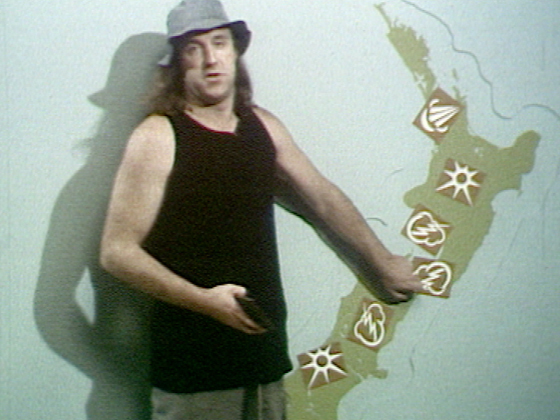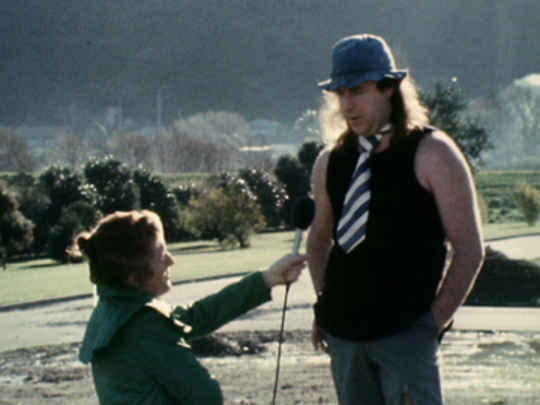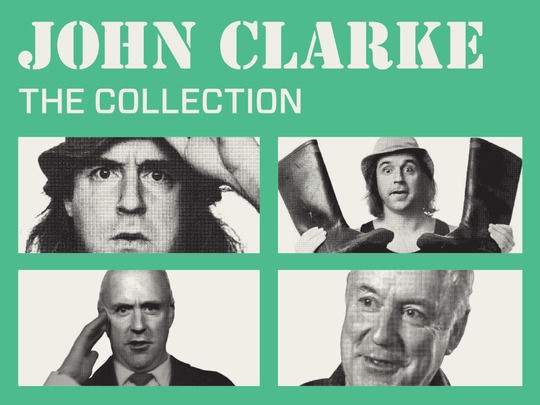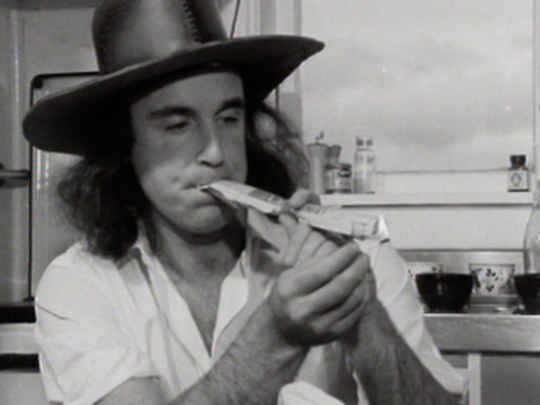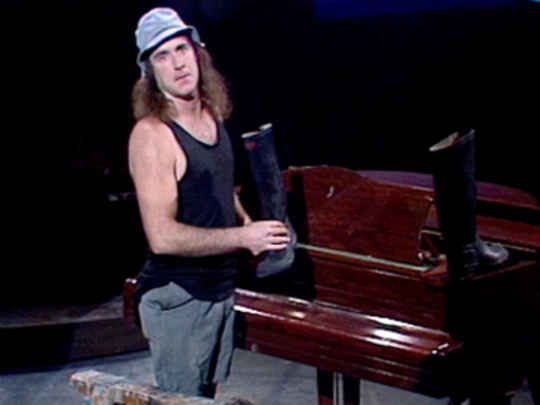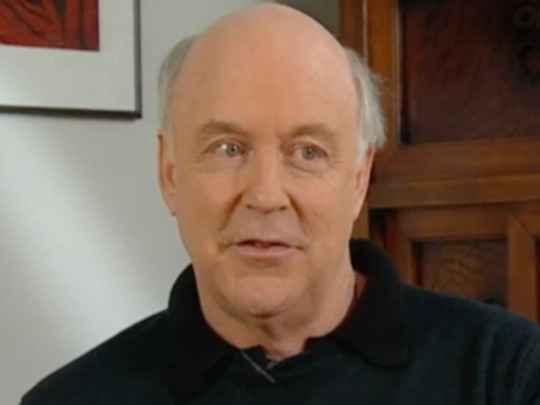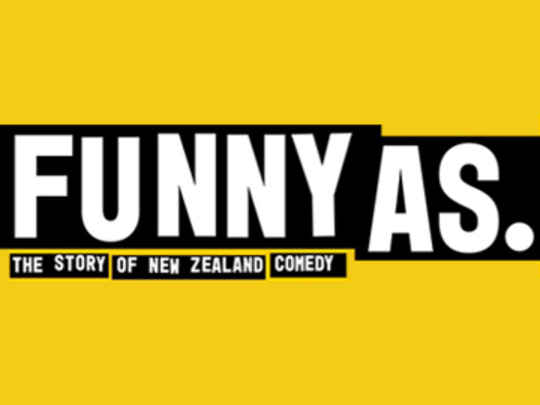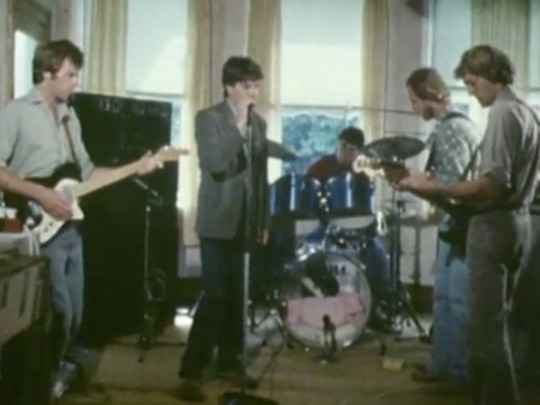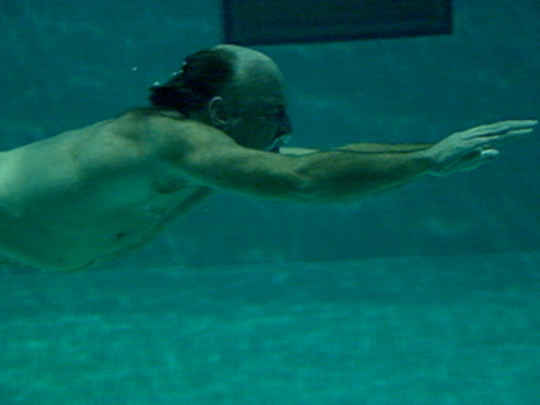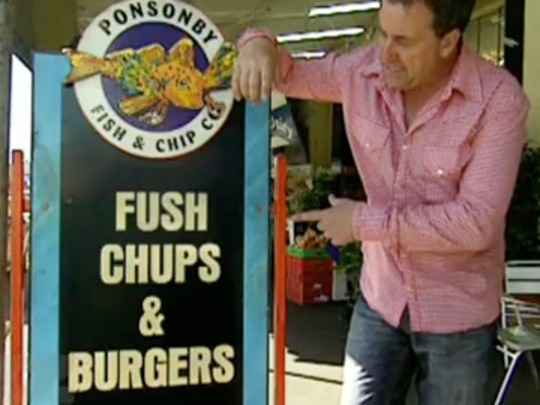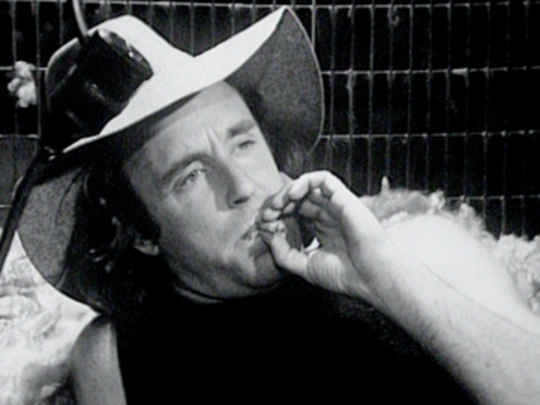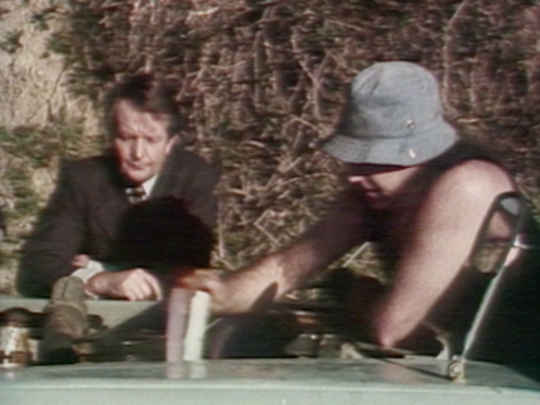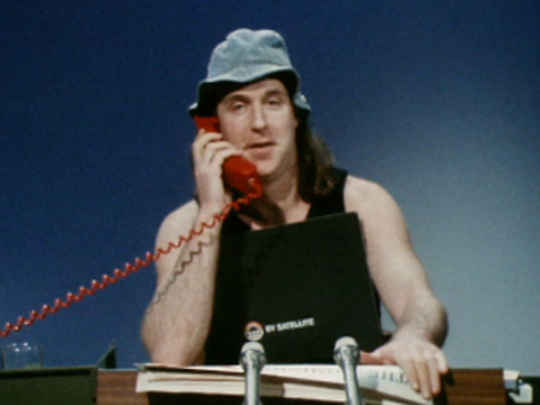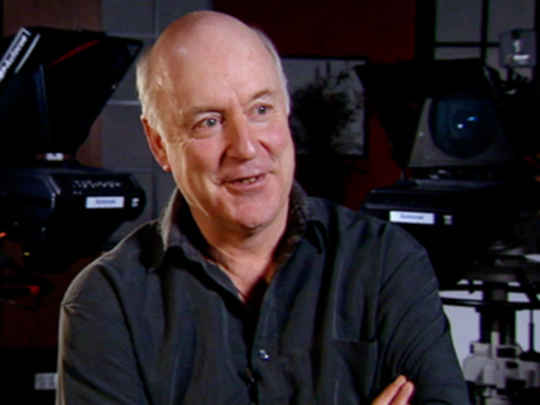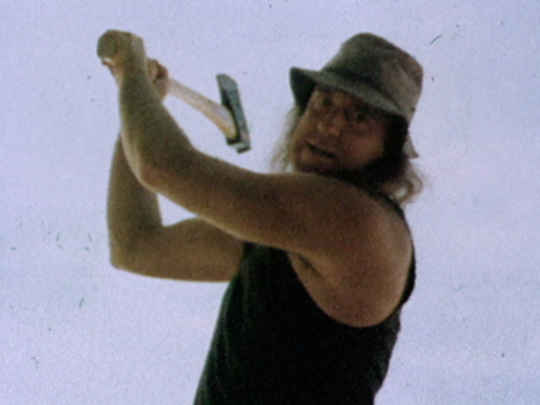(1) Fred Dagg reads the weather forecast
(2) Fred Dagg, an All Black & a priest on the Dagg Party
(3) Fred Dagg on newspaper coverage of the weather
(4) Fred Dagg on his policies as Prime Minister
(5) Fred Dagg fixes the TV aerial (1975)
(6) Fred Dagg on the benefits of alcoholic sheep
(7) Fred Dagg on his business interests
(8) Fred Dagg plays golf
(9) Fred Dagg muses on the etchings of Picasso
(10) Fred Dagg on inflation
(11) Fred Dagg on the rise of MPs
(12) The Dutch Ambassador's views on NZ's love of sport, & lack of joie de vivre
(13) Fred Dagg on superannuation
(14) Fred Dagg on film censorship (1975)
(15) Fred Dagg on the price of beer
(16) Fred Dagg on the SIS tapping phones
(17) Fred Dagg on government borrowing
(18) Fred Dagg's Christmas message for 1976
Tonight at Nine - Fred Dagg Skits
Television (Excerpts) – 1975 - 1976
His Name is Dagg
John Clarke was fascinated by the rhythms of how New Zealanders speak — and by how words can be used to evade, exaggerate and make a story sound more interesting. Clarke's fascination with words and storytelling fed into his best comedy: like his character Fred Dagg, and his fake interviews with Australian Bryan Dawe.
When Fred Dagg first hit television in 1973 — on a current affairs show — it continued a trend where Kiwi TV comedy got relegated to the sidelines, instead of getting its own chance to shine. Dagg was only on-screen for a few minutes at a time, but he quickly won a keen following. The character spoke loud and proud in a Kiwi accent, at a time when local TV presenters often sounded as if they hailed from England. As comedy veteran Paul Horan has said, Dagg's comedy "slotted into who we were; it wasn't over the top, but it was eloquent ... he was clever, and didn't speak down to you".
It's not easy to trace exactly when Fred Dagg first emerged — and how he developed. Although we're on fairly solid ground to say that Fred Dagg's television debut was on Gallery on 18 December 1973, Dagg was likely born far earlier. Clarke performed similar characters back at university — and probably earlier still.
As a child, Clarke tried out "different accents and appearances". Dagg, he once said, "grew up alongside me". The character drew inspiration from many voices: "a couple of very amusing uncles"; legendary racehorse commentator Peter Kelly, and other Kiwis Clarke met, who were "obvious and surreal, saying nothing and talking interestingly".
Clarke later spoke of another key influence on his comedy, aside from his love of how New Zealanders spoke — the way that British comedian Peter Cook constructed "a seperate and completely plausible universe inside his own head".
As the 1970s began, there were early Dagg sightings. When Clarke began acting in university revues in Wellington, his friend Simon Morris recalled shows where Clarke was "riveting", amidst the chaos around him. "He was a great improv person, old John". Clarke would later describe his time at university as "the beginning of my life"; he would trace a direct line from his Victoria University performances to Fred Dagg.
One in Five, which opened on 3 May 1971, was pulled together by Roger Hall after the university's annual comedy and music show fell over. In one sketch, Clarke's character Bruce spells out his name to a mate over the phone, in a voice that sounds fairly daggy. In another, Clarke's Farmer Brown wore a singlet, shorts and gumboots (the sketches can be heard on album The Brian Edwards Show).
Clarke then did time in London, where he met comedy heroes like Peter Cook and Spike Milligan. But as Clarke explained (40 minutes into this interview), he had no dreams of making it big in England. New Zealand was where he wanted to "make it work" — whatever that meant. It was "where I knew the local references, I spoke the language ... I didn't want to pretend to be someone else. I needed to find a way in which being me was a living".
Soon after returning to New Zealand, Fred Dagg made his screen debut on Gallery. Clarke had been invited to add some light relief to the long-running current affairs show. "David Exel was the reporter and we had to give the character a name. He thought Fred. I thought Dagg. So it was." In another interview, Clarke recalled being keen "to do something on television that had some impact". What was needed was "a recognisable kind of iconography ... a hat, a black singlet.."
Dagg soon become a regular current affairs fixture thanks to his short, often improvised items on Nationwide and Tonight at Nine. Sometimes Clarke became a one man band, operating the camera alone. But it was easier when he had someone to spark off; like when he was interviewed by one of the reporters.
Clarke looked back in best of compilation The Dagg Sea Scrolls (2006). "Public response was immediate and very gratifying. And a good thing too, because there were some jitters at what might be called the management level in New Zealand broadcasting at the time."
Dagg proved he could do more than monologues, with this beloved 1974 episode of Country Calendar. Dagg was becoming a big star: passers-by honked horns and asked for autographs. To ease his workload, Clarke asked varsity colleague John Barnett to become his manager.
Meanwhile Clarke was grappling with people in state television who seemed reluctant to let him off the leash, arguably fearful he would critique the status quo. They may have also felt threatened by his talent. This was an age where if a comedy show ran too long, the director was liable to sort the problem by throwing away the final six pages of the script (as happened one time on Buck House).
Facing challenges in getting a longer TV show going, and earning little from his TV appearances, Clarke diversified. Fred Dagg featured on T-shirts, albums, and ads (one potential client ended up tripling their offer in their desperation to get Dagg on board). Dagg's first book Fred Dagg's Year (1975) won advance orders of 30,000. The following year Clarke did an extensive live tour.
Album Fred Dagg’s Greatest Hits proved a major hit. The beloved 'Gumboot Song' (aka 'Gumboots') spent almost four months in the NZ charts. It was born after Dagg needed a big finish for a live show, with female impersonator Marcus Craig. The song "was hastily cobbled together", based on a Billy Connolly track (itself inspired by another song).
In 1977 Clarke moved to Melbourne. But Dagg brought him back. As a favour to director Geoff Murphy, he made half-hour romp Dagg Day Afternoon (1977). Costa Botes writes here that it was part of a double bill with Murphy's romp Wild Man. The following year, Clarke presented The Fred Dagg Lectures on Leisure. The now lost TV series covered everything from UFOs to saving whales.
Clarke would make Melbourne his home until his death in April 2017; his most Kiwi of creations lasted for a few more years after leaving Kiwi soil. Dagg was syndicated across Aussie radio until around 1980, and there were very occasional TV appearances, and another album (The Fred Dagg Tapes.) Many of Dagg's wise words ended up in anthology books like A Dagg at My Table.
At one point there were even plans for a full-length Fred Dagg movie. In 1979 Clarke described the script as his "magnum opus" — a "carefully constructed piece of satire with a carefully considered story". One draft, written with fellow expat Roger Simpson, reached 160 pages. But perhaps it was for the best that Fred Dagg's reign was short — and sweet.
- Ian Pryor is editor of NZ On Screen.
